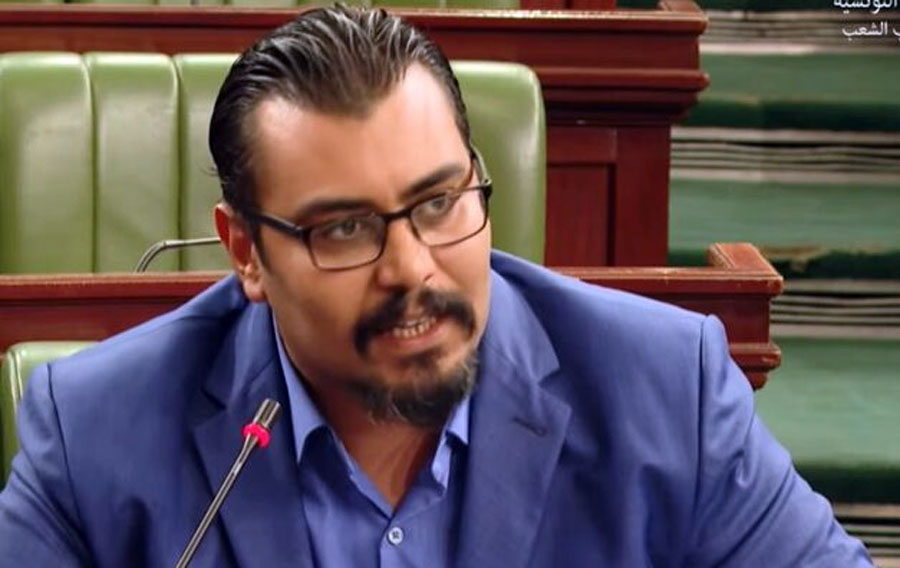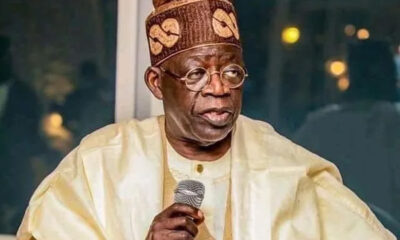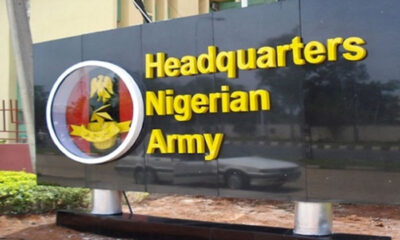Africa
Military airstrike kills over 100 in Sudanese market

Military airstrike kills over 100 in Sudanese market
A Sudanese military air strike on a market in North Darfur killed more than 100 people on Monday, a pro-democracy lawyers’ group said Tuesday, in a war marked by claims of atrocities on all sides.
The emergency Lawyers said Monday’s air strike also left hundreds injured in Kabkabiya, a town about 180 kilometres (112 miles) west of El-Fasher, the state capital that has been under siege from the paramilitary Rapid Support Forces (RSF) since May.
Tens of thousands have been killed and millions displaced in a 20-month war between the RSF and Sudan’s military that has left the northeast African country on the brink of famine, according to aid agencies.
“The air strike took place on the town’s weekly market day, where residents from various nearby villages had gathered to shop, resulting in the death of more than 100 people and injury of hundreds, including women and children,” said the lawyers’ group, which has been documenting human rights abuses during the conflict.
In footage sent to AFP purporting to show aftermath of Monday’s strike, people were seen sifting through rubble as the charred remains of children lay on scorched ground.
The footage was supplied by civil society group the Darfur General Coordination of Camps for the Displaced and Refugees and AFP has not been able to verify its accuracy.
The lawyers group said in a separate incident on Monday evening three neighbourhoods were hit with barrel bombs in Nyala, the capital of South Darfur, without reporting casualties.
READ ALSO:
- UCL: Salah scores as Liverpool beat Girona to reach last 16
- 7 men arrested for allegedly raping 4 minors in Katsina
- Naira depreciates to N1,585/$ in parallel market
Darfur, a region the size of France, is home to around a quarter of Sudan’s population but more than half of its 10 million are displaced.
A UN-backed report in July said famine had taken hold in a major refugee camp in North Darfur after a months-long RSF siege disabled nearly all trade and aid access.
‘Escalation campaign’
The lawyers group said they “condemn in the strongest terms the horrendous massacres committed by army air strikes” in Kabkabiya.
They flagged another incident in North Kordofan state in which drone that had crashed on November 26 exploded on Monday evening, killing six people.
They said recent strikes across Sudan were part of an “escalation campaign… deliberately concentrated on densely populated residential areas”, contradicting claims by warring parties that they only target military objectives.
Both the army and the RSF have been accused of indiscriminately targeting civilians and deliberately bombing residential areas.
Last week, UN humanitarian chief Tom Fletcher called for immediate international action to address Sudan’s deepening crisis.
Fletcher said he had heard “heart-rending stories” from refugees fleeing the conflict during a recent visit.
Nearly 26 million people — about half the population — face the threat of starvation, with both sides accused of using hunger as a weapon of war.
“These numbers are staggering, and we cannot turn our backs,” Fletcher said.
Military airstrike kills over 100 in Sudanese market
Africa
Lawmaker Jailed for Mocking President in Facebook Post

Lawmaker Jailed for Mocking President in Facebook Post
A Tunisian court has sentenced Ahmed Saidani, a sitting lawmaker, to eight months in prison for mocking President Kais Saied in a Facebook post linked to the president’s response to recent flood disasters in Tunisia.
The ruling was delivered on Thursday, deepening concerns over free speech, political repression, and shrinking civic space in the North African country.
Mr Saidani was arrested earlier this month after posting a sarcastic message reacting to Kais Saied’s visit to flood-hit communities. In the post, the lawmaker mocked the president’s public appearances, suggesting Saied had assumed the role of both national leader and sanitation official.
“It seems that the new title will be the Supreme Commander of sanitation and rainwater drainage,” Saidani wrote, adding that his comment was “not a mockery” of the president, but a reflection on governance priorities.
Prosecutors charged the lawmaker under Tunisia’s telecommunications law, which criminalises online insults and criticism made through digital platforms. The law allows for prison sentences of up to two years.
READ ALSO:
- Police to Arrest TikToker Mirabel After She Recants False Rape Claim
- Tinubu Reduces Reliance on U.S, Strengthens Defence Partnerships With Turkey, EU
- Again, Early Morning Blaze Destroys Dozens of Shops in Kano Market
Legal sources said the court found the post insulting to the head of state and ruled that it exceeded the bounds of protected political expression.
Political and Legal Context
The sentencing has sparked outrage among opposition figures, activists, and rights organisations, who argue that the case highlights an ongoing crackdown on dissent in Tunisia.
Mr Saidani was once a supporter of President Saied but later became a vocal critic, accusing the administration of centralising power, sidelining institutions, and suppressing opposing voices.
Since 2021, Tunisia has undergone sweeping political changes following President Saied’s decision to dissolve parliament and rule largely by decree. Critics say these moves have weakened democratic checks and emboldened the use of laws to silence critics, including lawmakers, journalists, and civil society actors.
Human rights advocates warn that the increasing use of criminal prosecutions for social media posts threatens political debate and accountability, particularly at a time when the country faces economic hardship, infrastructure failures, and climate-related disasters.
The government, however, maintains that all prosecutions are conducted within the law and insists that no one is above legal accountability.
Lawmaker Jailed for Mocking President in Facebook Post
Africa
Gabon Suspends Social Media Over False Information, Cyber Threats

Gabon Suspends Social Media Over False Information, Cyber Threats
The government of Gabon has ordered a nationwide suspension of social media platforms “until further notice,” citing the spread of false information, cyberbullying, and unauthorised sharing of personal data as threats to national security, social cohesion, and public order.
The announcement was made by the High Authority for Communication (HAC) in a televised address. HAC spokesperson Jean-Claude Mendome explained that the measure aims to curb the circulation of “inappropriate, defamatory, hateful, and insulting content”, which authorities believe have been fueling unrest and deepening social divisions.
While HAC did not specify which platforms would be immediately affected, widely used applications such as WhatsApp, Facebook, TikTok, and Instagram are expected to be included in the restrictions. By Wednesday, several users reported that Facebook and TikTok were already inaccessible, indicating the government may begin enforcement imminently.
READ ALSO:
- BREAKING: Academic Activities Halted as ASUU Resumes Strike
- Ramadan Health Tips: Six Ways to Stay Hydrated While Fasting
- Tinubu Urges Senate to Confirm Yusuf for NAHCON, Marafa for INEC
The suspension comes amid a sensitive political and social period in Gabon. The country has been undergoing a transition since the 2023 military coup led by President Brice Oligui Nguema, who later won the 2024 presidential election with over 90% of the vote, ending more than five decades of Bongo family rule. Since taking office, Nguema promised reforms and a break from past practices, including allowing independent media to observe election processes — a departure from the use of internet blackouts by previous administrations.
Despite these reforms, the government faces growing social and economic pressures. Teachers launched strikes in December 2025 over unpaid salaries and worsening working conditions, and unrest has since spread to healthcare workers, civil servants, and other public-sector employees. These protests have heightened concerns over public order and digital misinformation, prompting the government’s move to restrict social media access.
Civil society groups and analysts have raised concerns about the impact of the suspension on freedom of expression, economic activity, and digital communication, noting that approximately 850,000 Gabonese actively rely on social media for business, news, and personal communication. The government, however, insists the action is a temporary security measure to prevent further destabilisation.
Observers say Gabon’s decision reflects a broader challenge across Africa, where governments attempt to balance cybersecurity, misinformation control, and digital freedoms. The coming days will test both the government’s resolve and the resilience of the country’s digital economy.
Gabon Suspends Social Media Over False Information, Cyber Threats
Africa
Ghana Moves to Extradite Russian Man Over Secret Sex Video Scandal

Ghana Moves to Extradite Russian Man Over Secret Sex Video Scandal
The Government of Ghana has announced plans to seek the extradition of a Russian man accused of secretly recording sexual encounters with several women and sharing the footage online without consent, describing the alleged acts as serious violations of cybersecurity, privacy, and women’s rights.
African and Russian media identified the suspect as a self-styled “pick-up artist” and online blogger in his 30s who travelled to Ghana and allegedly filmed intimate encounters without the knowledge of the women involved. Some reports claim he used sunglasses fitted with a hidden camera to record the encounters and later circulated the videos on social media platforms. Ghanaian authorities, however, said investigations are ongoing and have not officially confirmed the recording method.
Speaking to journalists, Ghana’s Minister for Communication, Digital Technology and Innovation, Sam George, said he had invited the Russian ambassador in Accra for discussions, stressing that the alleged actions violate Ghana’s cyber-security laws and would not be taken lightly.
He said preliminary findings by the Ministry of Gender, Children and Social Protection suggest the suspect has likely left Ghana, but emphasised that his departure does not reduce the seriousness of the alleged conduct or the government’s obligation to ensure accountability.
READ ALSO:
- Residents Flee as Gunmen Launch Fresh Attack on Kwara Community
- DSS Probes El-Rufai’s Claim of Toxic Chemical Import by Ribadu
- Senate Explains Why Real-Time E-Transmission Cannot Be Mandatory in 2027 Elections
According to the minister, Ghana will activate international cooperation mechanisms, including Interpol, to trace the suspect and seek the cooperation of Russia.
“We will activate every resource at our disposal, working with Interpol and Russian law enforcement. We want the gentleman brought back to Ghana to face the rigours of our law,” George said, adding that the government would still formally request extradition despite Russia’s long-standing policy of rarely extraditing its citizens.
He noted that Ghana may consider trying the suspect in absentia if he refuses to return to face prosecution.
Local media reports also indicate that the same individual may have been involved in similar illegal recordings in Kenya, raising concerns about multiple victims across different countries and the possibility of a broader pattern of abuse.
Under Ghana’s Cybersecurity Act, 2020, the non-consensual recording or distribution of intimate images or videos is a serious criminal offence, carrying penalties of up to 25 years in prison. Authorities say the law was enacted to address rising cases of online sexual abuse, revenge pornography, and digital exploitation, particularly targeting women and children.
Ghana has intensified enforcement of these laws in recent years. In 2022, a court sentenced Solomon Doga, a 22-year-old phone repairer, to 14 years in prison after he pleaded guilty to sharing nude images without consent in a sexual extortion case.
Officials say the current case underscores Ghana’s determination to protect digital privacy, public trust, and the dignity of women, as investigations into the Russian suspect continue.
Ghana Moves to Extradite Russian Man Over Secret Sex Video Scandal
-

 Business21 hours ago
Business21 hours agoDangote Opens Refinery Investment to Nigerians With Public Share Sale Plans
-

 Politics3 days ago
Politics3 days agoPeter Obi Launches ‘Village Boys Movement’ to Rival Tinubu’s City Boys Ahead of 2027
-

 Education1 day ago
Education1 day agoUTME: JAMB Clarifies Position on Hijab During Biometric Capture
-

 News3 days ago
News3 days agoPolice to Arrest TikToker Mirabel After She Recants False Rape Claim
-

 International3 days ago
International3 days agoEpstein, Ex-Israeli PM Named in Alleged Profiteering From Boko Haram Crisis
-

 Politics15 hours ago
Politics15 hours agoTinubu Hails Wike as APC Dominates 2026 FCT Area Council Elections
-

 Education3 days ago
Education3 days agoOgun Gov Rewards Nigeria’s Best Primary School Teacher with Car, Bungalow
-

 Politics2 days ago
Politics2 days agoADC Defeats APC to Win First Polling Unit in FCT Area Council Election















